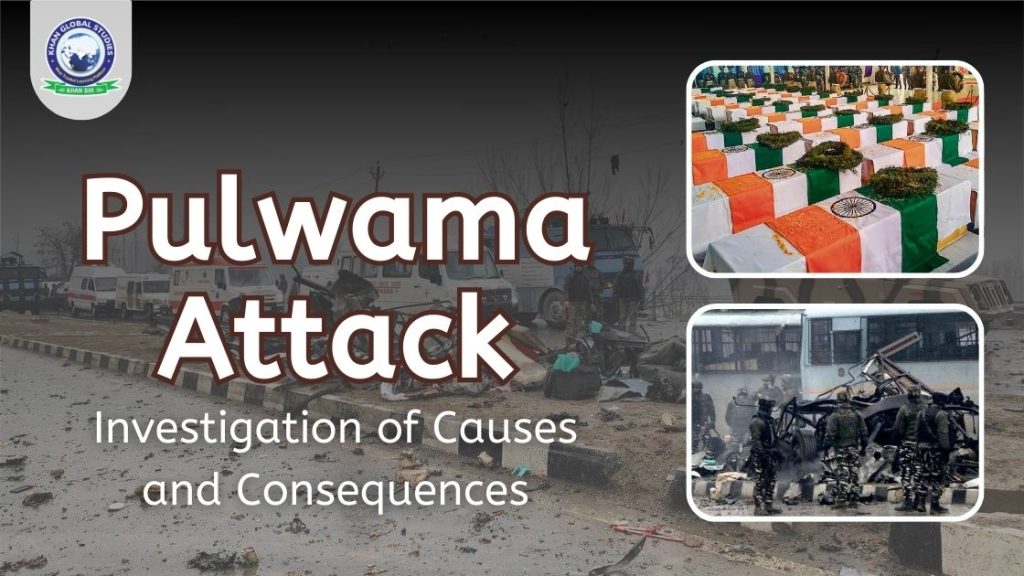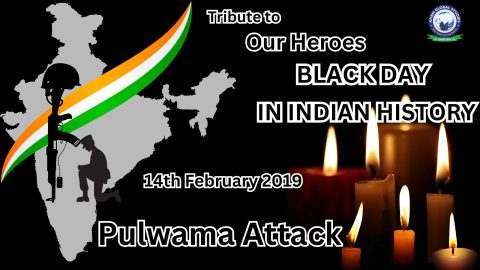On February 14, 2019, a suicide bomber targeted a convoy of Central Reserve Police Force (CRPF) personnel in Pulwama, Jammu and Kashmir. The attack by Pakistan-based terrorist group Jaish-e-Mohammed shocked the country, in which 40 CRPF personnel lost their lives and many were injured. Today, five years later, the Pulwama attack is a reminder of the sacrifices made in the fight against terrorism. This day is also called the “Black Day of India”.
Attack and its Consequences
On 14 February 2019, at around 3:00 pm, a Jaish-e-Mohammed terrorist rammed an explosives-laden vehicle into a CPRF convoy on the Srinagar-Jammu National Highway. Nearly 40 CRPF soldiers were martyred in an attack by a suicide bomber of Pakistan-backed Jaish-e-Mohammed targeting a CRPF convoy in Pulwama. The CRPF convoy had 78 buses. Tension increased between India and Pakistan after this attack.
After the terrorist attack, the soldiers were admitted to a nearby army hospital, but a large number of soldiers were martyred on the spot. The attacker who carried out this incident was named Adil Ahmed Dar. Apart from this, terrorists Sajjad Bhatt, Mudasir Ahmed Khan etc. were also involved in the attack and were later killed by the army. This case was investigated by the National Investigation Agency (NIA), in which it had filed a charge sheet of more than 13 and a half thousand pages. The United Nations and several countries around the world condemned the Pulwama terrorist attack and extended their support to India in the fight against terrorism.
At the same time, the mortal remains of the soldiers were brought to the Palam Air Force area by a special Air Force aircraft, where many senior ministers including the then Home Minister and current Defense Minister Rajnath Singh were present. The mortal remains of the martyrs were wrapped in the tricolour. Prime Minister Narendra Modi had paid tribute to the martyred soldiers.
After the attack, on February 17, Prime Minister Narendra Modi announced that I feel the same fire in my heart that is burning inside you. He said that “all tears will be avenged” and that the armed forces have been “given full freedom to decide the time, place of retaliatory action against the enemy”.
On 26 February 2019, at around 3 am, 12 Mirage 2000 fighter planes of the Indian Air Force crossed the Line of Control (LOC) and destroyed Jaish-e-Mohammed terrorist hideouts in Balakot. According to sources, 300 terrorists nurtured by Pakistan were killed in this attack. About thousand kilos of bombs were dropped on terrorist hideouts in the air strikes. After the Pulwama terrorist attack, Prime Minister Narendra Modi had given the responsibility of planning revenge against Pakistan to NSA Ajit Doval. Apart from him, the then Air Force Chief BS Dhanoa also played an important role in the airstrike.
Beyond the Numbers
While official figures report 40 deaths, the human cost of the Pulwama attack is much higher. Families lost loved ones, colleagues mourned their comrades and the entire country grappled with the shock of the incident. The emotional wounds run deep, a constant reminder of the fragility of life and the sacrifices of those who stood against terror.
Going Forward
The Pulwama attack highlights the ongoing threat of terrorism and the need for vigilance. It also stressed the importance of national unity and solidarity in adversity. Although the pain may never completely subside, the memories of fallen heroes continue to inspire courage and resilience.
Beyond Remembrance
Remembering the Pulwama attack is more than honouring the sacrifices. It is a call to actively fight terrorism, promote peace and understanding, and strive for a world where such tragedies never happen again.




